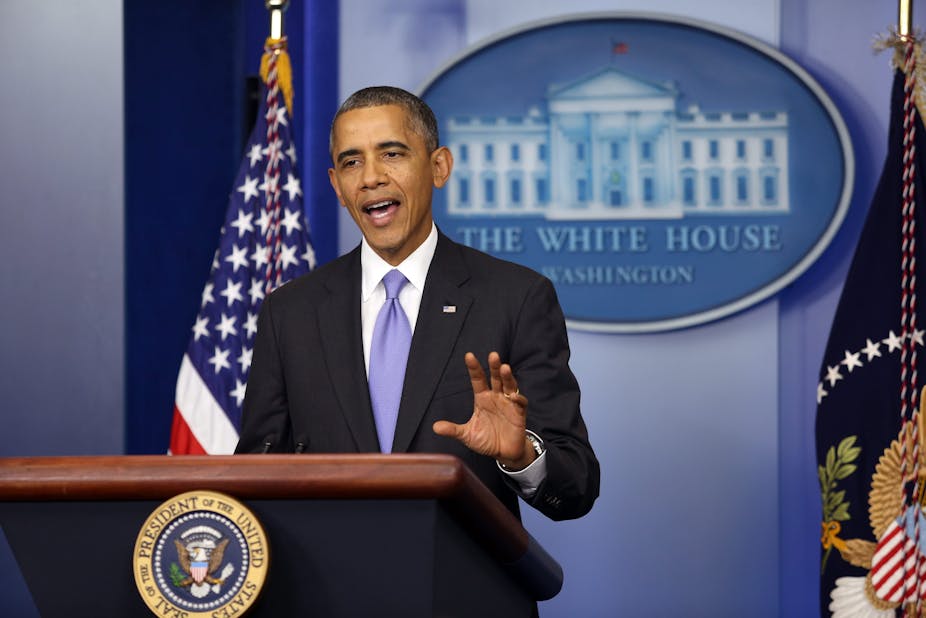The confrontation - and the ultimate resolution - over the debt ceiling and the government shutdown has, to date, been the defining moment of US president Barack Obama’s second term. It offers an important insight into the current state of US politics, for both the Democratic and Republican parties.
Late on Wednesday night (US time), the latest instalment in governing by crisis concluded in Washington when Congressional Republicans capitulated and agreed to pass a bill raising the debt ceiling and ending the 16-day government shutdown.
The episode was a stinging defeat for the Republican Party. Not only did they fail to delay “Obamacare” or secure any other major policy concessions, but they’ve also taken the brunt of the blame for the shutdown as well. Recent polls show both the Tea Party and the Republican Party, as a whole, have record-low approval ratings.
However, despite the debacle, the Republican Party’s immediate electoral prospects aren’t as bleak as they seem for two reasons. First, the 2014 mid-term elections are still over a year away, which leaves plenty of time for the political winds to shift and the shutdown to fate from voters’ minds.
Second, the average Republican-controlled House seat is decidedly more conservative than the country as a whole, providing Republican members of Congress with a partial buffer from national political trends.
For Democrats to gain control of the House next November (they already hold the majority in the Senate), there needs to be a strong and sustained backlash against the Republicans. If voting were held today, America would very likely see that kind of swing. But 13 months out, the climate is much more uncertain.
Regardless, the failure of the Republicans’ shutdown strategy is illustrative of the more long-term existential threat the party faces. As was made evident over the past two weeks, there is a significant divide between the views of the Republicans’ Tea Party base and those of the American public. This is a gap that is likely to only grow as the country becomes increasingly ethnically diverse.
Republican moderates can certainly do more to disassociate themselves from the far-right flank of their party. However, the Tea Party isn’t simply a Republican fringe movement, but rather it is a significant and currently essential subset of the party’s electorate. With regards to the Tea Party, Republican leadership faces a “can’t live with them, can’t live without them” dilemma.

To make matters worse, the Republicans managed to alienate both independents with its strong-arm debt ceiling tactics and hardliners upset that the party eventually caved. Party loyalists are now tasked with trying to mend relationships with centrists while simultaneously guarding their right flank against another round of primary challenges in the coming year.
None of this is to say a Republican candidate couldn’t win the presidency in 2016. Economic factors and other short term contingencies often outweigh larger political trends in any given election cycle. But until the party undergoes a difficult and potentially lengthy re-branding effort, it’s going to become progressively more difficult to compete on a national level.
Obama and the Democrats, on the other hand, emerged from the crisis in a much better position. It’s not that they are overwhelmingly popular: Obama’s approval rating sits at a tepid 43.4%, so much as that they aren’t the Republicans. Right now, that seems to be enough.
Democrats have also already capitalised on the standoff, using it as a tool to recruit new congressional candidates and raise money. As such, even if the shutdown has faded from the public consciousness by the next election cycle its impact could still be felt.
However, don’t expect recent events to spur any sort of major legislative progress. The two parties remain so deeply divided that it will take electoral change to bring an end to the gridlock. At this point, the most one can realistically hope for is that things remain civil enough to avert another shutdown or financial catastrophe in the next few months.
It’s certainly not much, but compared to where America was just a few days ago, it sounds blissful.

